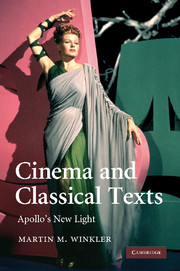Book contents
- Frontmatter
- Contents
- List of illustrations
- Acknowledgments
- ΦΟΙΒΩΙ ΑΠΟΛΛΩΝΙ ΦΩΤΟΚΙΝΗΤΗΙ
- Introduction: The god of light and the cinema eye
- 1 A certain tendency in classical philology
- 2 Divine epiphanies: Apollo and the Muses
- 3 The complexities of Oedipus
- 4 Patriotism and war: “Sweet and fitting it is to die for one's country”
- 5 Helen of Troy: Marriage and adultery according to Hollywood
- 6 Women in love
- Epilogue: “Bright shines the light”
- Bibliography
- Index
5 - Helen of Troy: Marriage and adultery according to Hollywood
Published online by Cambridge University Press: 18 August 2009
- Frontmatter
- Contents
- List of illustrations
- Acknowledgments
- ΦΟΙΒΩΙ ΑΠΟΛΛΩΝΙ ΦΩΤΟΚΙΝΗΤΗΙ
- Introduction: The god of light and the cinema eye
- 1 A certain tendency in classical philology
- 2 Divine epiphanies: Apollo and the Muses
- 3 The complexities of Oedipus
- 4 Patriotism and war: “Sweet and fitting it is to die for one's country”
- 5 Helen of Troy: Marriage and adultery according to Hollywood
- 6 Women in love
- Epilogue: “Bright shines the light”
- Bibliography
- Index
Summary
The most beautiful among mortal women in ancient myth is Helen of Troy (originally, of Sparta). Famous in Western culture long before Eve, whose story depended for its familiarity on the spread of Christianity, Helen is the West's original femme fatale. The most fascinating aspect of her story is her illicit love for Paris, the handsome son of King Priam of Troy. Aphrodite, the goddess of love, had promised Paris the most beautiful mortal woman in return for awarding Aphrodite the prize of supreme divine beauty. Unable to resist such a tempting bribe, Paris made his fateful judgment. He then traveled from Troy to Greece for his reward. Helen was the wife of Menelaus, king of Sparta, and mother of Hermione. But she fell victim to the passion instilled in her by Aphrodite. As Virgil famously put it, if in a different context: “Love conquers all.” Helen, “crazed by the Trojan man,” followed Paris to Troy. Hence the Trojan War and the fall of Troy, antiquity's biggest myth.
Dangerous beauties for whose sake men rush to ruin themselves and others are naturals for popular storytelling in word and image. Especially gripping in tales of two lovers' irresistible passion for each other is the added complication of adultery, which makes one or both of them leave behind all sense of morality, shame, and responsible behavior.
- Type
- Chapter
- Information
- Cinema and Classical TextsApollo's New Light, pp. 210 - 250Publisher: Cambridge University PressPrint publication year: 2009



